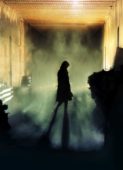CRAVE by Sarah Kane
 This has been a stimulating Directors’ Cuts season, and the best has been kept until last. Crave is an extraordinary prose-poem for which writer Sarah Kane supplied no setting, no stage directions and no descriptions of its four characters, who are known merely as ‘A’, ‘B’ ‘C’ and ‘M’. Therefore, some directors have quite legitimately been starkly minimalist in approach, having the four actors stand facing the audience throughout its fifty minutes. But director Jessica Rose McVay has rejected such a static interpretation of Kane’s pulsating text, much of which is delivered in short, one-line phrases. Meticulous choreography gives shape to every word, and the actors most definitely interact, often in a powerfully physical manner. Their expressions of pain, desire and desperate hope are reflected in Eleanor Bull’s set design, a wasteland of discarded baby buggy, old fridge-freezer and wrecked car.
This has been a stimulating Directors’ Cuts season, and the best has been kept until last. Crave is an extraordinary prose-poem for which writer Sarah Kane supplied no setting, no stage directions and no descriptions of its four characters, who are known merely as ‘A’, ‘B’ ‘C’ and ‘M’. Therefore, some directors have quite legitimately been starkly minimalist in approach, having the four actors stand facing the audience throughout its fifty minutes. But director Jessica Rose McVay has rejected such a static interpretation of Kane’s pulsating text, much of which is delivered in short, one-line phrases. Meticulous choreography gives shape to every word, and the actors most definitely interact, often in a powerfully physical manner. Their expressions of pain, desire and desperate hope are reflected in Eleanor Bull’s set design, a wasteland of discarded baby buggy, old fridge-freezer and wrecked car.
This play is dark, touching on themes such as child abuse, rape and mental breakdown. But there are moments of beauty, not least when Ross O’Donnellan as ‘A’ delivers a monologue in which he describes his hopes for a future relationship: ‘… and give you tapes you don’t listen to … and watch great films and watch terrible films … and complain about the radio … and take pictures of you when you’re sleeping…’ The accumulative effect of this long list of very ordinary, even clichéd images is strangely moving, aided by the musicality of O’Donnellan’s rich Irish brogue.
If there is a central character it is perhaps ‘C’, played with great intensity by Georgia Frost. A half-remembered childhood trauma both haunts and baffles her: ‘…and if this makes no sense, you understand it perfectly.’ Frost conveys very powerfully the agony of a woman whose inability to understand the source of her sorrow means she has no hope of ending it. Rosie Gray is ‘M’, perhaps an older woman, smiling enigmatically and often addressing the audience directly. Equally enigmatic is Chris Jenks’s ‘B’, who occasionally expresses himself in other languages, one of the play’s many nods to Eliot’s The Waste Land. All four actors handle the rapid interplay of words with great skill, their movement and gestures chiming precisely with the music and meaning of the text.
All four of the Directors’ Cuts plays have presented a bleak vision of the human condition, none more so than Crave: ‘What I sometimes mistake for ecstasy is simply the absence of grief.’ Bleak, certainly, and in this brave, inventive production, unforgettable. ★★★★★ Mike Whitton 24th May 2017
I AM THE WIND by by Jon Fosse
 Director Charlotte Marigot has made a brave choice with I Am The Wind, for with its long silences, gnomic utterances and periods of inaction, there are those who will find that this play’s sixty-five minutes is a test of their patience. She has said that a feature that intrigues her is its ‘capacity of expressing so much by saying nothing’. Indeed, Norwegian playwright Jon Fosse has created a work in which very little is made specific. There are two nameless men sailing on a small boat, and virtually nothing that they say or do gives any hint as to their lives before this voyage. At the tiller is ‘The One’, torn between a desire for solitude and silence and a terror of such emptiness, and struggling with the inability of language to express with any kind of precision the reality of his dilemma. ‘The Other’ is a less experienced sailor, and is less inclined to bleak introspection, seeming interested solely in trying to pin down the nature of his companion’s existential angst. Is ‘The One’ a symbolic figure representing Thanatos, the death-wish? And does his friend represent Eros, the life force? Such a Freudian interpretation is entirely plausible, but countless other meanings could be ascribed to this near-abstract canvas. ‘The One’ frequently ends his musings with ‘Maybe’, and that uncertainty pervades the entire play.
Director Charlotte Marigot has made a brave choice with I Am The Wind, for with its long silences, gnomic utterances and periods of inaction, there are those who will find that this play’s sixty-five minutes is a test of their patience. She has said that a feature that intrigues her is its ‘capacity of expressing so much by saying nothing’. Indeed, Norwegian playwright Jon Fosse has created a work in which very little is made specific. There are two nameless men sailing on a small boat, and virtually nothing that they say or do gives any hint as to their lives before this voyage. At the tiller is ‘The One’, torn between a desire for solitude and silence and a terror of such emptiness, and struggling with the inability of language to express with any kind of precision the reality of his dilemma. ‘The Other’ is a less experienced sailor, and is less inclined to bleak introspection, seeming interested solely in trying to pin down the nature of his companion’s existential angst. Is ‘The One’ a symbolic figure representing Thanatos, the death-wish? And does his friend represent Eros, the life force? Such a Freudian interpretation is entirely plausible, but countless other meanings could be ascribed to this near-abstract canvas. ‘The One’ frequently ends his musings with ‘Maybe’, and that uncertainty pervades the entire play.
As ‘The One’, Freddie Bowerman is entirely convincing as a man unable to escape the bleak negativity of his own inexpressible thoughts, and Edward Stone is equally impressive as ‘The Other’, a positive figure initially, but one left frightened, bewildered and abandoned at the end. I also liked Charlotte Cooke’s set, suitably stark and simple, and James Melsome’s sound design is very effective, creating a palpable sense of impending disaster. Charlotte Marigot’s direction has included some welcome touches of physical comedy, and the final few minutes are truly moving. This is a production with many merits, but the play itself suffers from more than a whiff of adolescent pretentiousness. ★★★☆☆ Mike Whitton 17th May 2017

ICELAND by Nicholas Billon
Director Geoffrey Brumlik is a Canadian, and Iceland is by his fellow countryman, Nicolas Billon. In this three-hander the actors do not interact with each other. Instead, each of them delivers an extended monologue, so the creation of dramatic interest depends entirely upon their ability to convey events, personality and motivation entirely through narration.
Verity Blyth is Kassandra, an Estonian student studying history at UWE. To make enough money to be able to send some back home she has resorted to working for an ‘escort agency’. Blyth uses Kassandra’s difficulties with the English language to great effect, for this is a young woman who does indeed struggle to find meaning. She is a lost soul, unaware perhaps of quite how severe that loss might be.
Bradley Banton is Halim, one of Kassandra’s customers. He is brash, super-confident and in love with money, gleefully challenging our liberal sensibilities with his cynical assertion that ‘everyone’s a materialist at heart’. Banton is particularly good at engaging directly with the audience, Iago-like.
The third character is Anna, recently evicted from a rented property that Halim now owns. Sarah Livingstone deftly conveys Anna’s vulnerability and self-righteousness in a performance that is both funny and poignant. A committed Christian, Anna is only partly aware of her own considerable failings.
When Kassandra, Halim and Anna meet, there is a train-crash collision between God and mammon. Dark, and often darkly comic, Iceland places very considerable demands upon its cast. This production is blessed with three very talented story-tellers who succeed admirably in engaging us in their inter-related tales. This year’s Directors’ Cuts season continues to hit the heights. ★★★★☆ Mike Whitton 10th May 2017
 SEX WITH A STRANGER by Stefan Golaszewski
SEX WITH A STRANGER by Stefan Golaszewski
Sex With A Stranger is the first production in this year’s Directors’ Cuts season from the Bristol Old Vic Theatre School. It has a non-linear structure, with brief scenes that frequently jump backwards or forwards in time.
Adam has met Grace at a friend’s birthday party and he appears to be in luck, for she is taking him back to her flat. Their nervous chat is toe-curlingly banal, punctuated with periods of awkward silence. She frequently giggles; he stares into space. Alice Kerrigan’s portrayal of Grace allows us to see the fragility that lies beneath her cheerful, up-for-it exterior. As Adam, Euan Shanahan conveys a different kind of inner unease, for this young man has a live-in girlfriend, Ruth, that he has left back at home. We shift back to an earlier point in the evening, when Ruth is ironing Adam’s shirt. There’s surely an echo of Look Back In Anger here. Laura Waldren movingly depicts Ruth’s growing realisation that ‘a lads’ night out’ is not all that Adam has in mind.
Director/Movement Director Alexandra Moxon has used brief dance sequences between scenes to act as a kind of commentary on the shifting relationships of the three characters. At times the grace and passion of a balletic episode illustrates the stark contrast between their romantic aspirations and the bleakness of their lives. Sex With A Stranger is not without humour, but it takes a cold, hard look at a modern brief encounter. This is an impressive production as bracing as a chill wind. It sets the Directors’ Cuts season off to a flying start. ★★★★☆ Mike Whitton 3rd May 2017



